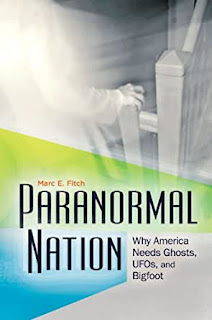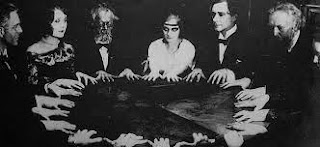Research Blog #7: Theoretical Frame
I am using the theory of the “naturalizing” effect and the academic concept of social influence to help me analyze and explain my project. My questions are: In what ways do ghost hunting technologies falsely legitimize the scientific aspect of the paranormal? How does the media (i.e., paranormal programming) perpetuate these misunderstandings? The theory of the “naturalizing” effect suggests that presenting inaccurate information in a convoluted scientific manner tricks people into thinking that the inaccurate information is actually correct and just scientific but difficult to understand. This theory can be applied to show that by presenting ghost hunting technologies as scientific, the media misleads viewers into believing that such technologies are actually scientific when they are not. The "naturalizing" effect was proposed by Dr. David Kirby, a professor of science communication from the University of Manchester. Kirby applies this theory to science fiction, but for my project, I am applying it to reality television and real life ghost hunting. Social influence also shows that witnesses of OPEs (ostensibly paranormal experiences) are easily swayed by other people into believing that what they saw was paranormal or into recalling events that did not happen (Wilson). Social influence is interesting because it relates to the naturalizing effect, which depends on suggestions (implicit or explicit) from other people. Social influence also takes away the need for explanations to be scientific because people tend to favor popular opinion over scientific support (Ridolfo). I plan on using social influence as my counterargument to the “naturalizing” effect, as social influence eliminates the need for scientific evidence in ghost hunting.
Kirby, David A. “Scientists on the Set: Science Consultants and the Communication of Science in Visual Fiction.” Public Understanding of Science, vol. 12, no. 3, July 2003, pp. 261–278, doi:10.1177/0963662503123005.
Ridolfo, Heather, et al. “Social Influences on Paranormal Belief: Popular Versus Scientific Support.” Current Research in Social Psychology, vol. 15, no. 3, Center for the Study of Group Processes, 2010, pp. 33–41. https://bit.ly/37ubSUF
Wilson, Krissy, and Christopher C. French. “Magic and Memory: Using Conjuring to Explore the Effects of Suggestion, Social Influence, and Paranormal Belief on Eyewitness Testimony for an Ostensibly Paranormal Event.” Frontiers in Psychology, vol. 5, FRONTIERS RESEARCH FOUNDATION, 2014, pp. 1289–1289, doi:10.3389/fpsyg.2014.01289.


Comments
Post a Comment